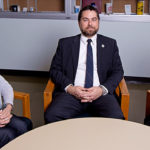International Collaboration Looks at European Immigrant Skill Levels
An international research collaboration between the UWF Department of Government and a visiting scholar from the Netherlands is seeking to understand what shapes attitudes toward immigrants in Europe.

Dr. Michelle Williams, chair of the University of West Florida Department of Government and professor of political science, and Panagiotis Chasapopoulos, a graduate researcher from Tilberg University in the Netherlands, began corresponding after Chasapopoulos read Williams’ book “The Impact of Radical Right-Wing Parties in West European Democracies” and reached out to her.
“I was really excited we were able to make it possible to bring him here all the way from the Netherlands so that we could spend some time working on a project together that will become a part of his dissertation,” Williams said.
With Williams’ research specialization in right-wing parties and Chasapopoulos’ background in economics, the pair was able to approach the issue of people’s perceptions of immigrants from different disciplines.
“Panos is here to collaborate with me on the anti-immigrant and political side of the project because he’s an economist,” Williams said. “However, he works in an interdisciplinary social science setting where they really look at policies from a variety of disciplinary perspectives – from the economic perspective, but also the political perspective, the sociological perspective, the psychological, the anthropological, the historic perspective. And they deal with a lot of real-world, real-time policy issues.”
Chasapopoulos said the issue is one that is playing out across Europe right now and affects millions of people.
“Immigration is really a hot topic all over the world and especially in Europe, not only because of the recent refugee crisis but also because Europe is an area that hosts the most immigrants around the world,” he said. “Europe hosts more than 75 million immigrants. In the last 15 years, Europe added more than 20 million immigrants – 1.3 million per year.”
With that many people coming into Europe, attitudes toward those immigrants have become less welcoming.
“We see immigration is increasing, population diversity is increasing, and at the same time, this has an effect on the way that people see immigrants,” Chasapopoulos said. “At the same time, we see a trend of increasing ethnic exclusion. We see that Great Britain decided to get out of the European Union. Extreme-right parties and parties with anti-immigrant agendas are increasing their popularity in Europe from France to Austria to Hungary.”
The pair began looking at factors that could determine how natives feel about immigrants.
“We were interested in examining the other side of the picture of anti-immigrant attitudes,” Williams said. “Typically, when people study anti-immigrant attitudes, they study it from the perspective of the person who holds those attitudes. And often people are characterized as having those attitudes because they’re racist or xenophobic. Another characterization has been from an economic perspective as a threat in the labor market, or they (immigrants) are viewed as a drain on the social welfare system.”
The pair also considered how contact with immigrants affects attitudes.
“Higher concentrations of immigrants – do those affect people’s attitudes more positively because they have more contact and therefore they understand immigrants better, or more negatively because they don’t find those people to be like them and therefore they resent them?” Williams said.
After considering the possible factors, the researchers came up with their research question.
“What we were interested in is how the traits of the immigrant affect the attitude toward the immigrant, rather than the attitudes that are held by the attitude-holder as if they emerge only from within that person themselves,” Williams said.
The pair chose to look at the education and skill level of immigrants, with the idea those with higher skill levels might be more desirable. They also looked at cultural values of immigrants with the supposition that the closer in culture the immigrants are to the native population, the more easily they would be accepted.
As the researchers said the results of their studies surprised them.
“Contrary to our expectations, we didn’t find that the skill level of immigrants is an important predictor,” Chasapopoulos said. “However, the cultural values play an important role.”
Surface characteristics as obvious as skin color and religious dress colored native’s perceptions of immigrants.
“We found, for instance, that in regions where the proportion of immigrants were from the Middle East or North African countries who traditionally present a more Muslim population have an increased culture threat,” Chasapopoulos said.
Those cultural differences were twice as important to natives than the perceived economic threat of immigrant populations was, according to the research.
“The people were afraid not because they think that immigrants will take their jobs, according to our findings, but because people are different – in their religion, the values they have, the way that in general they lead their lives,” Chasapopoulos said.
Despite the initial negative attitude that many natives have toward immigrants, the research also revealed another cultural phenomenon that occurs over time.
“We found at the same time that probably the contact theory works. The more we interact with people, the more open we are to them,” Chasapopoulos said. “We found in regions with high proportions of people coming from other European Union countries, that immigrant attitudes are less strong. The closer and more comfortable you feel with someone, the more open you are.”
While the research indicates a general link between contact and attitude, Williams said the pair plans to further study how different types of contact affects people’s attitudes.
“The next steps we hope to take in our research is to look at actual examples of the different types of contact people have with immigrants,” Williams said. “The data allows us to look at whether or not someone works with an immigrant, whether someone has an immigrant family member or they date an immigrant or live next door to someone who’s migrated from another country.”
Williams said the experience of having Chasapopoulos as a visiting scholar has been positive and that the pair plans to continue to collaborate.
“It’s been a great experience to have Panos come to UWF so that he and I could collaborate and work more closely on the project,” she said.



